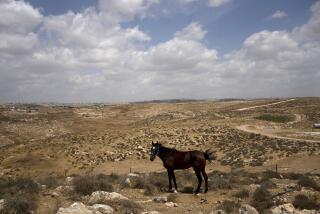Supreme Court Upholds Gaza Pullout Law
JERUSALEM — Israel’s Supreme Court on Thursday upheld a compensation law, erasing the main legal challenge to the government’s plan to withdraw settlers from the Gaza Strip and part of the West Bank.
In a 10-1 decision, the court rejected claims that the law, enacted this year to provide a legal framework for the pullout, would violate the rights of about 8,000 settlers who are to be removed from their homes this summer. The justices ruled on a dozen petitions covering various aspects of the compensation law.
In the majority opinion, the justices said their decision was limited to legal questions. But they acknowledged that deep divisions over the plan have proved wrenching for Israel.
“These are difficult times. A divided nation. Fear of violence. A painful and difficult separation of thousands of Israeli settlers from stretches of land where they have lived for years is approaching,” the justices said in the introduction to the 320-page ruling.
But they determined that the law was proper and the compensation fair.
The decision removes the most serious potential legal obstacle to the evacuation plan, which calls for abandoning all 21 Gaza settlements and four others in a corner of the northern West Bank.
Officials said the ruling should prompt settlers to give up their fight and begin making plans to leave.
“Now we expect the residents to apply for compensation with the appropriate committees, the sooner, the better,” Osnat Mandel, who supervises Supreme Court petitions in the state attorney’s office, told Israel Radio.
The justices ordered technical changes in aspects of the compensation that will probably increase the cost of the now nearly $1-billion plan.
Most families will receive between $200,000 and $500,000, according to a formula that considers mainly the size of the home, length of stay and number of children. But many settlers complain the compensation isn’t enough to cover the value of their houses, many with views of the Mediterranean, and to buy new homes in Israel.
Attorneys for the settlers expressed disappointment, though they had held out little hope the court would toss out the law. The settlers sought unsuccessfully to have the justices visit the areas to be evacuated before ruling.
“The Supreme Court doesn’t see the expulsion of 10,000 Jews from their homes with nothing in return as a problem, and this is a pity,” attorney Yossi Fuchs told reporters.
Effi Eitam, a conservative lawmaker who has been a leading opponent of the pullout, said the decision marked “the collapse of the last bastion of the democratic regime in Israel.”
The ruling comes as new polls show a slide in support for the evacuation, which had the approval of two out of three Israelis a few months ago. New surveys show about 50% support, with opposition still below 40%.
A government plan to relocate many of the settlers to a coastal area north of the Gaza Strip also is being challenged in the Supreme Court by environmentalists. They say that building hundreds of homes in the area will damage an adjacent stretch of dunes and the habitat for plants and wildlife.
Justices who heard the environmental case this week said they wanted the two sides to work out a compromise, although they said they were prepared to render a decision soon if negotiations failed.
In other developments, Palestinian Authority President Mahmoud Abbas met in Gaza City with representatives of militant factions that launched a spate of mortar and rocket attacks at Israeli targets two days earlier. The strikes had drawn warnings of reprisals from the Israeli military.
On Tuesday, a Palestinian rocket strike killed three greenhouse workers, a Chinese laborer and two Palestinians, in the Ganei Tal settlement in the southern Gaza Strip. Israel responded Wednesday with an airstrike against a rocket crew, but no one was hit.
Spokesmen for the main Palestinian militant groups, including Hamas, said they would continue to observe the conditional cease-fire they agreed to at Abbas’ urging in March. But they vowed to respond to what they consider Israeli aggression.
Abbas also hopes to iron out differences with Hamas over his decision to postpone Palestinian legislative elections, which were scheduled for July 17. Leaders of Hamas, which plans to run against Abbas’ Fatah faction in the balloting, were angered over the delay. A new date has not been set.
Also Thursday, an Israeli watchdog group said army checkpoints and roadblocks continued to hinder Palestinian life. The group, Machsom Watch, said in its annual report that Israel had removed few of the checkpoints since November, when Yasser Arafat died and a more moderate Palestinian leadership took over.
The group, citing United Nations figures, said only four of 61 permanent checkpoints in the West Bank had been removed; the number of other barriers dropped to 605 from 680.
The group, made up of 500 Israeli women who monitor checkpoints and roadblocks in the West Bank, said its members had witnessed widespread harassment and bullying of Palestinians by Israeli troops.
Israel says the checkpoints and barriers are needed to keep out suicide bombers and other attackers.
Authorities say they have thwarted bombing plots and intercepted numerous Palestinian teenagers carrying explosive belts at roadblocks since Abbas won election in January.
Times staff writer Shlomi Simhi in Tel Aviv contributed to this report.
More to Read
Sign up for Essential California
The most important California stories and recommendations in your inbox every morning.
You may occasionally receive promotional content from the Los Angeles Times.










